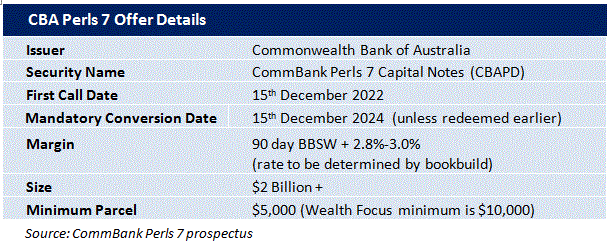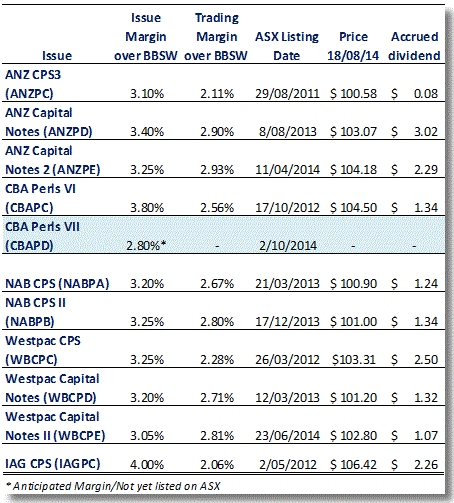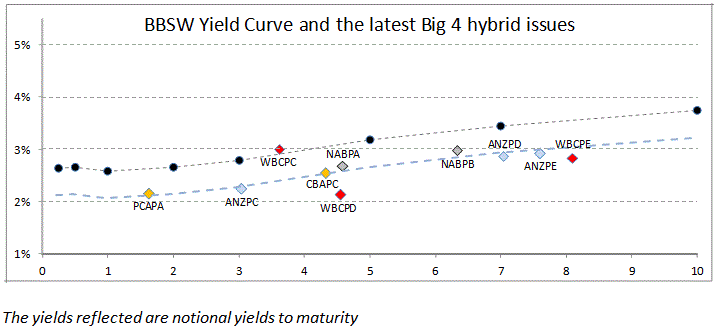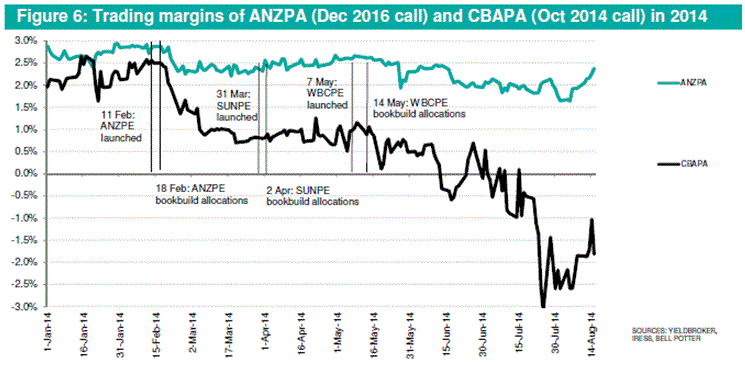CBA has just announced the launch of a new income offer: CommBank Perls 7 Capital Notes. The first round of access is through a broker firm allocation, prior to shareholder offer and listing in October. Note: There is no Customer or General Offer
The Notes will pay a quarterly coupon of 2.8%-3.0% (rate determined by the bookbuild) over the 90 day bank bill swap rate (BBSW), which was 2.64% as of 15th August, with an initial indicative rate of 5.46%-5.66%pa. (The first pricing is due to be set on date of issue) The Notes are expected to redeem on the 24th March 2022** and will be tradable on the ASX.

** It is expected that the issue will be repaid at the first opportunity in December 2022 with a scheduled conversion in 2024 (subject to mandatory conditions not being breached).
Comparative Securities
The easiest way to consider this issue is to compare it to other recent hybrids from the Big 4 banks, and, as with other recent issues, CBAPD contains capital and non-viability conversion clauses to satisfy APRA’s harder in the event that the bank falls on hard times.
We view ANZ Capital Notes 2 (ANZPE) and Westpac Capital Notes 2 (WBCPE) as the closest comparables, both maturing in 2022.
CBAPC, CBAPD, NABPA, NABPB, WBCPC & WBCPE structures offer a margin over the 90 day BBSW, ANZPC, ANZPD, ANZPE and WBCPD offer a margin over the 180 day BBSW.
Our analysis
CBAPD’s closest comparable, WBCPE, currently trades at $102.80 including a $1.07 accrued dividend (ex. div on 11th September 2014), with an effective margin to expected maturity of 2.8%pa. ANZPE, the next closest comparable, trades at an effective margin of 2.93%pa over the BBSW.
The key differences are CBA Perls 7’s slightly longer duration and a quarterly distribution payment versus WBCPE and ANZPE’s semi annual payments.
We have once again used the Bank Bill Swap Rate (BBSW), the rate that banks’ lend money to each other at, to use as a reasonable basis of how much you should expect to be rewarded for the extra duration.
Using CBA’s existing issues, PCAPA and CBAPC as a guide to yield, this would indicate 3.0% as a fair margin. However, if we consider that the wholesale bond market yield curve is slightly flatter and consider where ANZPE and WBCPE currently trade, with a further margin for quarterly payments, we would assess a fair margin as 2.7%-2.8% over the BBSW
Non-viability Clause, Capital Trigger Event and Inability Event
Investors who are familiar with the new style hybrids we have seen over the last couple of years will be very aware of these clauses.
It is perhaps useful to understand that these clauses are as a result of APRA requiring further reassurance that in another GFC event, if required , hybrids would convert to ordinary equity, thereby reducing the bank’s debt costs and protecting deposit holders.
Now that banks have to hold a higher level of capital and a better quality loan book, it seems unlikely that any of these conditions would be breached, however, investors would do well to consider the increased disclosure and warnings within each prospectus over the last couple of years.
For those unfamiliar with the conditions, new hybrids now contain non-viability and capital trigger clauses that should the bank’s Tier 1 Capital Ratio fall below 5.125% or APRA views the bank as non-viable without an injection of capital, the hybrids would automatically convert to ordinary shares.
We have also seen a gradual introduction of an Inability Event Clause added which states that in the event that the issuer is unable to issue further ordinary shares, ie the company has ceased trading, a Capital Trigger Event or Non-Viability Event, hybrid note holders lose their investment.
This is extremely unlikely, but investors would do well to remember the increase in yield offered carries additional risk.
For those looking for view of how much you should be getting paid for this additional risk.
Comparing some of the Subordinated Notes that were issued with and without these clauses, a margin of 0.2%-0.3%pa is what the market seems to be pricing this additional risk.
Our View on CBA Perls 7
As we have said before, the banks are now clearly aware that retail investors view these issues very differently to wholesale investors and are no longer leaving meat on the bone.
We continue to have concerns over the non-viability clauses within new style hybrids, but investors looking for yield without sharemarket volatility have little alternative. Term deposit yields have continued to fall and now leave investors with the dilemma of locking in low long term rates when interest rates are expected to rise or adding more risk within their portfolios.
Our view is that for investors who are happy to invest, relative to other bank comparables, CBAPD seems to be priced right and our preference over the current ANZPE and WBCPE issues.
The lack of issuance this year, the speed that ANZ and Westpac issues were snapped up, and CBA’s gold status with retail investors leaves us in no doubt that CBA will likely close early at a margin of 2.8% (indicative range 2.8%-3.0% over the 90 day BBSW).
Investors should also be aware that the primary role of Perls 7 is to refinance $ 2 Billion of Perls 5 and priority tends to be given to Perls 5 holders looking to roll their existing investments.
We have been selling clients out of CBAPA within our portfolios from around May this year as the higher returns offered by Cash Accounts meant CBAPA was no longer attractive. The trading margin has remained negative for much of the time since and we surmise this is due to investors buying CBAPA in an attempt to guarantee an allocation if/when a new issue was offered.
As a result, we expect that a considerable portion of the $2 Billion of CBAPA will roll into the new issue, leaving very little on the table for new investors.
Contact us if you would like an allocation to CBA Perls 7 or have an existing investment in CBA Perls 5 you would like to roll into the new issue.
Key features
- Indicative floating yield of 5.44-5.64%pa – based on current 90 BBSW of 2.64% and bookbuild margin range of 2.8-3.0%.
- Option to redeem at year 8 with scheduled conversion at year 10 -CBA has the option to convert in December 2022 or on any subsequent dividend payment date.
- Ordinary dividend restrictions -applies on the non payment of CBAPD dividends
- Automatic conversion under the Capital Trigger Event and Non-Viability
- Redemption highly likely in 8 years -although CBAPD has a 10 year maturity, its likely CBA will redeem/convert at the first call date in December 2022. Major incentives for redemption/conversion include the potential for reputational damage and risk of credit rating downgrade, leading to an increased cost of funding on future debt issues.
Note: CBA Perls 7 will be listed on the ASX and as such the price of the Note’s will be subject to market movements. Investors selling on market may receive a price lower (or higher) than the issue price.
Investors looking for an allocation can contact us on 1300 559 869
We encourage you to view our online presentation An Introduction to Fixed Income
Best regards
Sulieman Ravell
Wealth Focus Pty Ltd




Comment: